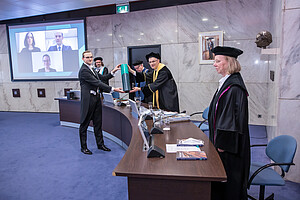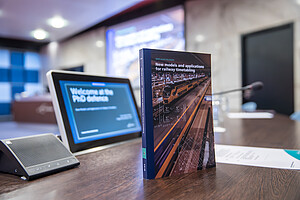PhD Defence Gert-Jaap Polinder

In his dissertation 'New models and applications for railway timetabling’, Gert-Jaap Polinder developed methods that can support the design of an optimal railway timetable such that the timetable is as good as possible. Using this ideal timetable, one can make clear whether regular departure patterns are useful or not, and how this is related with the expected travel time of passengers. Gert-Jaap Polinder has defended his dissertation on Friday, 18 December 2020 at 09:30h. His supervisors were Prof. Dennis Huisman (ESE) and Dr. Marie Schmidt (RSM). Other members of the Doctoral Committee were Prof. Rob Zuidwijk (RSM), Prof. Rob Goverde (TU Delft), Dr. Valentina Cacchiani (University of Bologna).
About Gert-Jaap Polinder

Gert-Jaap is born on January 22, 1991 in Zwolle, the Netherlands. He received his bachelor's and master's degree in Applied Mathematics from Delft University of Technology, with a specialization on Operations Research and Optimization. His graduation study involved an applied project at Netherlands Railways, to improve current periodic timetabling algorithms. He continued studying algorithmic approaches to design periodic timetables as a PhD-candidate at the department of Technology of Operations Management of Rotterdam School of Management. This is done in close cooperation with the department of Process quality and Innovation of Netherlands Railways, and under the supervision of Prof. Leo Kroon, Prof. Dennis Huisman and Dr. Marie Schmidt. As part of a collaborative project, Gert-Jaap spent two months in Bologna, Italy, to work with Dr. Valentina Cacchiani. He has presented his work on several international scientific conferences like TRISTAN, CASPT and INFORMS. He came in third in the 2019 INFORMS RAS Student Paper Competition. Furthermore, part of his work is published in scientific journals such as Transportation Research Part B: Methodological.
Thesis Abstract

A timetable is a crucial element for the daily operations of a railway operator. At the same time, designing such a timetable is an extremely complex puzzle, and years of investigations are necessary to design a timetable from scratch. Amongst several other aspects, planners should take the travel demand, connections between trains, capacity on the tracks and in the train, and daily disturbances into account when designing a timetable. Next to this, there are often too many restrictions that a timetable has to satisfy, such that no longer a timetable can exist satisfying all these restrictions.
In this thesis, methods are developed that can support the design of a timetable such that the timetable is as good as possible. For example, we can compute an ideal timetable, matching with travel demand as good as possible. Using this ideal timetable, one can make clear whether regular departure patterns are useful or not, and how this is related with the expected travel time of passengers. This can also be used to determine infrastructure-bottlenecks. Other methods in this thesis aim at relaxing a set of restrictions, if there are too many restrictions, or to make a timetable that is robust against minor disturbances.
View photos of Gert-Jaap's defence
Photos: Chris Gorzeman / Capital Images


